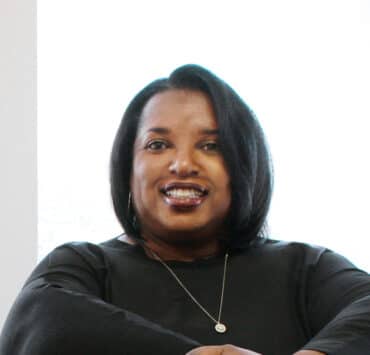|
Getting your Trinity Audio player ready... |
David Schwartz has had the perfect career. Need proof? Just ask his daughters.
Schwartz honed his craft at Toys “R” Us for fifteen years before arriving at his current position as executive vice president and general counsel at Hudson’s Bay Company (HBC). “For the first twelve years of their lives they had an in on every hot toy,” he recalls. “As they’ve outgrown that, they suddenly discovered Gucci, Prada, and Fendi along with an employee discount at Saks 5th Avenue. They’ve enjoyed my career transitions very much.”
For the past eighteen months, Schwartz has been busy not only meeting the business challenges that COVID-19 created in the retail space but also leading a transformation of HBC into a decentralized organization and establishing six legal departments.
Schwartz credits his experience at Toy “R” Us for prepping him to be able to meet the shifting needs of a global retailer as a global pandemic raged on. With a law degree and an MBA, he joined the toy giant in the early days of e-commerce and helped the company separate from a fraught relationship with Amazon.com Inc.
Eventually, Schwartz was able to expand into a non-legal role while remaining a general counsel. He was charged with managing different business functions including corporate communications, private label sourcing in China, and product safety.
“Learning how to navigate in different cultural environments was really exciting,” he says. “But after fifteen years, I had gotten to the point where I was ready for a new challenge. Looking at the life of Toys ‘R’ Us, at the time it might’ve been a good time to try something else.”
“We’ve had a tremendous amount of corporate transactions, refinancing, and challenges, but ultimately we have a very good group and good camaraderie of dedicated people, and it feels like I have many very long-term relationships.”
David Schwartz
At the Crossroads
So in 2016, Schwartz joined Hudson’s Bay Company, which is the oldest continuously operating company in North America. “There’s a spirit of adventure and entrepreneurship that we try to draw upon,” he says. “We challenge our folks to try new things and test new business ideas. I found that exciting.”
When he first joined, Schwartz recognized that the company was functioning at the crossroads of retail and real estate. At first blush, it’s known for iconic, luxury retail brands like Saks Fifth Avenue, Saks OFF 5th, and Hudson’s Bay. “At its core it had an incredibly valuable real estate base and a proven track record for finding creative ways to take advantage of that—it’s symbiotic,” Schwartz says. “The retail businesses are tenants in the real estate and the better the retail business do, then the more valuable they are as tenants, which increases the value of real estate.”
Schwartz saw an opportunity to unlock value in real estate by making better use of it as the world of retail was changing. “I could see that the company was at the early stages of a transformation,” he says. “It seemed like a great opportunity.”
On the legal side of things, Schwartz joined a department with redundant functions in Canada and New York that didn’t have great communication and interaction. So he reorganized everything by practice and function area rather than by geography. Now, lawyers on both sides of the border work together, resulting in improved quality of work and opportunities for the lawyers to grow and take on bigger roles.
Today, Schwartz sits at the parent company, helping manage all the assets but each of the businesses have their own legal groups that largely handle their own matters. Tying back into his expertise and love of working internationally, Schwartz was also given a similar opportunity at HBC as the company had ventured into Europe for retail businesses. “It was right in my wheelhouse of developing joint ventures and managing international relationships,” Schwartz says.
“There’s a spirit of adventure and entrepreneurship that we try to draw upon. We challenge our folks to try new things and test new business ideas.”
David Schwartz
Navigating Rough Waters
“We’ve had quite a year like everyone else in business,” Schwartz says. “We were a publicly traded company in Canada until late February 2020, just weeks before we realized we had a COVID-19 pandemic in North America.”
The company found itself shutting down stores while navigating the early development of a multitude of local, regional, and state regulations on closing stores while trying to take care of its employees. At the same time, Canadian stores were ordered closed for nearly ten months. “It’s a completely dependent food chain,” Schwartz says. “It hurts our suppliers and vendors. You can’t sell inventory the way you planned if the stores are closed.”
But Schwartz and HBC are not standing still. Through all of this, the company just launched a new mobile app for Saks OFF 5th.
“As long-standing outside counsel to HBC, we’ve partnered with David on numerous successful transactions and business challenges,” says Jonah Mann, partner at Stikeman Elliott. “At all times, David is focused on practical business advice and driving toward outcomes that are best for HBC.”
Looking to the future, Schwartz is eyeing the real estate value tied up in former Lord & Taylor stores. HBC now has about forty locations that can have tremendous redevelopment value.
A large scale internal real estate development group is looking at creating new uses and entitlements on these properties and developing them into things like multiuse locations. “I know they’re convenient locations because we’ve gotten a number of municipalities to use the stores temporarily to distribute COVID-19 vaccines,” Schwartz says.
As the company continues to figure out how it will function in the future, Schwartz has kept his priorities on what makes his job possible: the people around him. “We’ve had a tremendous amount of corporate transactions, refinancing, and challenges, but ultimately we have a very good group and good camaraderie of dedicated people, and it feels like I have many very long-term relationships.”
One of the accomplishments that Schwartz is most proud of is his role in developing people. “We’ve gone from having a single legal department to six legal departments that operate autonomously where the lead lawyer in those departments is reporting to the lead businessperson rather than to another lawyer,” he says. “That’s unique for both of those people.”
Even now, as his role continues to shift and the uncertainties pile up, Schwartz knows one thing: he wants to stay at HBC. “There’s still such a sense of adventure and entrepreneurism and so much potential that can still be unlocked,” he says.
The Modern-Day General Counsel
As told by David Schwartz
“The modern-day general counsel is really expected to be a businessperson. For my entire career, I’ve considered myself a business partner. I fully recognize that the executives I work with need practical guidance and advice, and I have to be comfortable knowing that you have to make decisions often without having 100 percent of the information or without having completely certain outcomes.
“The only way to take no risk at all is to go out of business. Regardless of the functions I have, even as a straightforward in-house lawyer, that’s what the business is looking for and needs. All businesses today expect that. I always viewed my GC role as the invitation that got me to the table. Once I was at the table, I could engage in the strategic conversations.
“If you’re fortunate enough to progress, you usually get to a place where you have the opportunity to manage other functions or other people who have expertise in areas beyond your own. Learn to get comfortable with doing that. The person I’m managing knows a whole lot more about it than I do, but you learn how to rely on and trust good people and the key to it all is good communication.”

